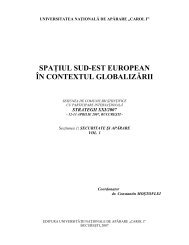Impact strategic nr.6-7 - Centrul de Studii Strategice de Apărare şi ...
Impact strategic nr.6-7 - Centrul de Studii Strategice de Apărare şi ...
Impact strategic nr.6-7 - Centrul de Studii Strategice de Apărare şi ...
- No tags were found...
Create successful ePaper yourself
Turn your PDF publications into a flip-book with our unique Google optimized e-Paper software.
PUNCTE DE VEDERE<br />
lui aplicării unui mandat <strong>şi</strong> ROE se bazează pe comandanţi<br />
<strong>şi</strong> personalul lor, care trebuie să fie pe <strong>de</strong>plin conştient <strong>de</strong><br />
restricţiile utilizării forţei militare <strong>şi</strong> a impactului pe care<br />
astfel <strong>de</strong> constrângeri politice, etice <strong>şi</strong> legale îl au asupra<br />
planificării <strong>şi</strong> conducerii operaţiunilor militare. Astfel,<br />
ROE au câteva scopuri, incluzându-le <strong>şi</strong> pe cele politice,<br />
ce ajută la asigurarea că toate forţele respectă politica<br />
guvernamentală sau a coaliţiei. Obiectivul ROE este <strong>de</strong><br />
a permite unui comandant libertatea maximă <strong>de</strong> acţiune.<br />
Politicienii îl pot restrânge pe comandant prin utilizarea<br />
<strong>şi</strong> schimbarea unei ROE; ei se pot implica, <strong>de</strong> asemenea,<br />
în procesul operaţional zilnic <strong>de</strong> luare a <strong>de</strong>ciziei, care<br />
i-ar putea restricţiona acţiunile. Sub preve<strong>de</strong>rile Dreptului<br />
Internaţional Umanitar un comandant are anumite<br />
responsabilităţi legale, care pot fi afectate <strong>de</strong> implicarea<br />
politică în aspectele operaţionale.<br />
Este indubitabil că <strong>şi</strong> marii oameni <strong>de</strong> stat fac greşeli;<br />
dar <strong>şi</strong> experţii militari ar putea să greşească, <strong>de</strong> asemenea,<br />
iar dacă sunt lăsate nerezolvate, aceste erori ar putea provoca<br />
<strong>de</strong>zastru în cursul războiului. Chiar <strong>şi</strong> cei mai buni<br />
comandanţi ar putea avea un punct <strong>de</strong> ve<strong>de</strong>re limitat, care<br />
este <strong>de</strong> înţeles datorită responsabilităţii lor profesionale <strong>de</strong><br />
conducere a unor operaţiuni concrete. De aceea, sarcina<br />
unui om <strong>de</strong> stat este <strong>de</strong> a înţelege scopul <strong>de</strong>plin al acţiunii<br />
militare <strong>şi</strong> <strong>de</strong> a <strong>de</strong>ci<strong>de</strong> când aprecierea politică trebuie<br />
să înlocuiască sau să restricţioneze preocuparea militară<br />
legitimă, chiar presantă. Bineînţeles, problema centrală<br />
a relaţiilor civil-militar într-o comunitate <strong>de</strong>mocratică<br />
nu este <strong>de</strong> a împiedica loviturile militare <strong>de</strong> stat, ci, mai<br />
<strong>de</strong>grabă, <strong>de</strong> a găsi relaţia a<strong>de</strong>cvată dintre prevenirea <strong>şi</strong><br />
utilizarea forţei, pe <strong>de</strong> o parte, <strong>şi</strong> obiectivele politicii, pe<br />
<strong>de</strong> alta. Cel puţin în ultimele trei <strong>de</strong>ca<strong>de</strong>, teoria “normală”<br />
a relaţiilor civil-militar susţine că cea mai sănătoasă <strong>şi</strong><br />
mai eficientă formă <strong>de</strong> control civil al armatei este aceea<br />
care izolează soldaţii <strong>de</strong> politică, dar le dă mână liberă în<br />
probleme militare. Trebuie să ne amintim, <strong>de</strong> asemenea,<br />
că operaţiunile militare sunt îngrădite <strong>de</strong> dreptul <strong>şi</strong> <strong>de</strong><br />
justiţia militară. Armata trebuie să aibă mereu în ve<strong>de</strong>re<br />
că distincţia dintre politică <strong>şi</strong> strategie se diminuează pe<br />
măsură ce se trece <strong>de</strong> la tactică la artă operativă; la vârf,<br />
a<strong>de</strong>vărata politică <strong>şi</strong> strategie sunt acela<strong>şi</strong> lucru.<br />
Putem concluziona că rolul autorităţilor politice în timp<br />
<strong>de</strong> conflict armat nu se manifestă numai la <strong>de</strong>clanşarea <strong>şi</strong><br />
încetarea ostilităţilor, ci poate fi esenţial chiar pe timpul<br />
<strong>de</strong>sfăşurării oricăror acţiuni militare.<br />
The fundamental goals and purposes of a nation are fulfilled by policy that gui<strong>de</strong>s both efforts and resources. Political lea<strong>de</strong>rs give<br />
general guidance to military strategy. The instruments of national power are political, military, economical and informational. For<br />
achieving the national objectives the states need a grand strategy plan including the political, military one and the economical strategies.<br />
Particularly, military strategy is the art and science of coordinating the <strong>de</strong>velopment, <strong>de</strong>ployment and employment of military<br />
forces for achieving the national security objectives. It inclu<strong>de</strong>s the operational strategy - the art and science of planning, orchestrating<br />
and directing a military campaign within a theatre of operations to achieve national security objectives. The purpose of strategy is to<br />
win in the theatre war because military objectives contribute to the achievement of a political objective. The national objective drives<br />
this process, the grand political strategy incorporating and/or coordinating all the instruments of national power, the military strategy<br />
supporting the national objectives. That is why there is a direct connection between the political and military aspects for achieving the<br />
fundamental aims of a country.<br />
War is a total phenomenon, its dominant ten<strong>de</strong>ncies make it always a fascinated trinity composed of: 1) primordial violence, hatred<br />
and hostility that are to be regar<strong>de</strong>d as a blind natural force; 2) the play of chance and probability within the free creative spirit (of a<br />
comman<strong>de</strong>r); 3) its instrumental element of subordination, the political force.<br />
The <strong>de</strong>cision of engaging in a war is always a political one. The command of the activity aimed at ensuring national and international<br />
security is the inalienable prerogative of the local legal political authorities of each country and of international organization within the<br />
approval of the Security Council. But not every military mean may be used in a war. Thus, the political authorities attempt to prohibit<br />
the use of specific weapons in warfare.<br />
The willingness of states (particularly <strong>de</strong>mocratic states) participating in multinational operations to apply agreed political and legal<br />
rules of conduct may assist in making the military action acceptable to governments, to reduce risk of domestic and third-party opposition,<br />
and make it politically more difficult for an adversary to <strong>de</strong>nounce the means used. On the other hand, the prospect of the enforcement<br />
of certain rules (such as prohibition of rapes, looting) not only by the national or international courts, but also within the armed forces<br />
themselves, may contribute to maintaining the internal discipline of armed forces.<br />
The entire military science and art <strong>de</strong>monstrate that war, combat actions cannot avoid the specific laws governing them. That is why the<br />
principles of armed fight, as a part of the military science and art, must be known for planning and carrying out military operations.<br />
War and military actions are governed by military laws. Through man’s will to protect himself, there must be complied some legal<br />
standards established by the political authorities. The laws that regulate war belong to internal law (the regulations regarding the problems<br />
of national <strong>de</strong>fence, ranging from the Constitution to the general military and combat handbooks) and international law (that settles<br />
the problems of opening, <strong>de</strong>veloping and ending military hostilities by means of customary law and conventional agreements). While<br />
there are no specific problems as far as the necessity and possibility to regulate internally the planning and carrying out military operations,<br />
when it is about the international law we must say that it is justified by the fact that the scale of war is more than an international<br />
scale or with international bearings. That is why the states try to normalize their wartime relations by imposing some rules on starting,<br />
<strong>de</strong>veloping and ending an armed conflict.<br />
IMPACT STRATEGIC nr. 1-2/2003<br />
177



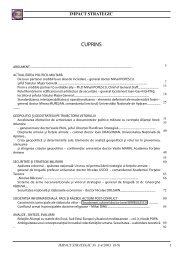

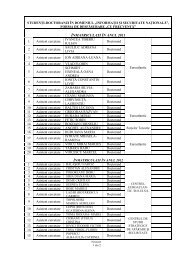
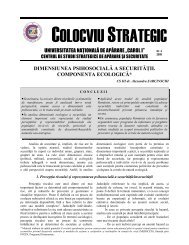
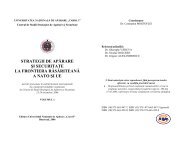
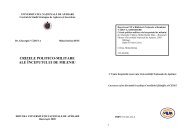



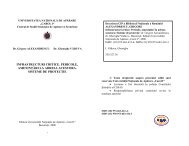
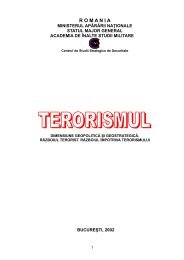

![„CAROL Nr 4 [29]/2008](https://img.yumpu.com/53801719/1/184x260/carol-nr-4-29-2008.jpg?quality=85)
